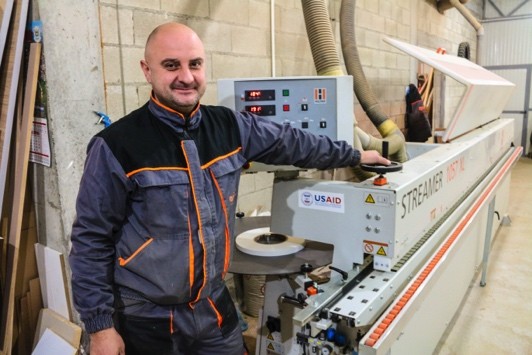
April 2017—Due to political conditions in this small Balkan country, it is challenging for many Kosovo businesses to create new partnerships within their own ethnic community—let alone to build trust with a business from a different region or ethnic community.
USAID has been working continuously to facilitate such partnerships since 2012.
In 2004, a year that marked clashes between Kosovo’s ethnic Albanian majority and ethnic Serbian minority, Goran Jocić, then 22, started his own wood processing company out of a small workspace in his parents’ house. Over the years, his talent in woodwork earned him a strong reputation in the north of the country mostly dominated by Serbs.
However, it wasn’t until he was invited to Kosovo’s first countrywide wood industry convention in October 2016 that he was able to connect with the country’s largest distributors in the south.
“At the convention, I realized that my products were very competitive with what is being produced in southern Kosovo,” Jocić explains. “That gave me the confidence I needed to take the plunge and start expanding my business for export.”
USAID’s EMPOWER Private Sector project, which helped organize the convention, connected Jocić and two other wood processors from northern Kosovo with the southern wood processor PSA Germany, who was looking for subcontractors to help fill an order of cutting boards for export to Germany.
Based in part on the promise of this new partnership, Jocić recently signed a lease on a new 1,000-square meter factory space where he will nearly triple his current staff to fulfill the growing demand for his products.
As a result of these partnerships with southern distributors—in addition to two new greenhouses he received this year from the EMPOWER project—farmer Jovan Milovanović, from northern Kosovo, has been able to double his production over the past year.
“Before, I could only grow enough vegetables for my family to sell at the local green market,” says Milovanović. “Now my vegetables are being sold in supermarkets all over Kosovo.”
In the coming year, Milovanović will take his business to the next level by selling his tomato seedlings to other local farmers so they can collectively grow a commercial quantity for southern exporter Fresh. To do this, Milovanović and other farmers will partner with Agrocenter, a local produce collection and cooling center, to ensure that their tomatoes maintain their quality and freshness while awaiting export.
Agrocenter owner Zlatko Sekulić initially built the cooling chamber to store his own apple crop for export, but with support from USAID, he expanded the facility to meet the storage and calibration needs of 60 local family farms in addition to other apple farmers from southern Kosovo.
“With this new facility, I can meet my initial goal of being the primary collection and export center for all of Kosovo’s apple production, as well as help other farmers in the north to move into commercial production,” Sekulić beams.
Southern distributors are welcoming collaborations with northern producers and putting national economic interests before ethnic divisions. One such southern distributor is Xhevat Zymeri, owner of Fresh, who says that “Kosovo citizens should overcome barriers from the past and join forces to support Kosovo-made produce over foreign imports.”
The five-year USAID EMPOWER Private Sector project, which is also funded by the Swedish International Development Cooperation Agency, has been working since July 2014 to stimulate large-scale job creation by elevating the competitiveness of Kosovo firms in the growth-ready sectors of apparel, wood processing, ICT, renewable energy, tourism and metal processing. To date, the project has created over 1,700 new jobs across Kosovo, with plans to create a total of 5,000 new jobs by July 2019.
LINKS
USAID’s mission in Kosovo
A New Generation of Democracy Pioneers Gets Down to Work in Kosovo
Follow @USAIDKosovo, on Facebook, on YouTube







Comment
Make a general inquiry or suggest an improvement.